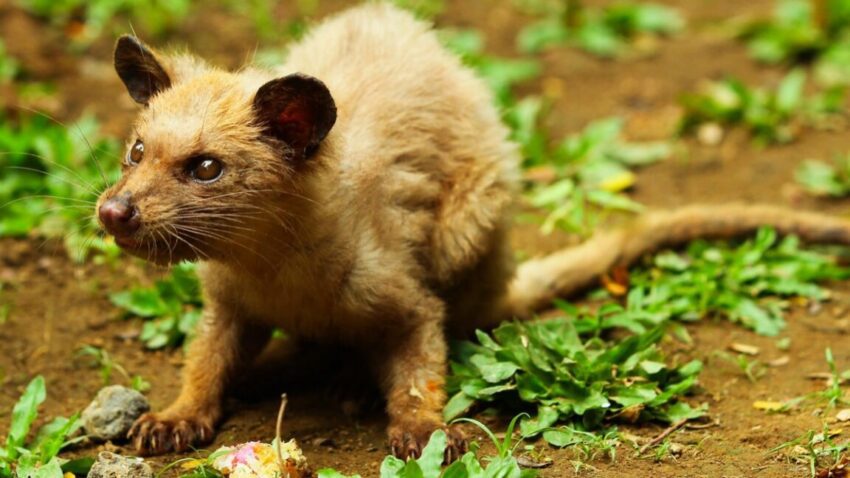
the chemistry behind that pricey cup of A recent study sheds light on the unique fermentation process that contributes to the distinctive flavor of kopi luwak, a coffee made from beans harvested from civet feces.
the chemistry behind that pricey cup of
The Allure of Kopi Luwak
Kopi luwak, often touted as one of the most expensive coffees in the world, has gained notoriety not just for its price but also for its unconventional production method. Featured in popular culture, such as the 2007 film The Bucket List, the beverage is portrayed as a luxurious indulgence. In the film, Jack Nicholson’s character, a billionaire, is introduced to this exotic coffee, only to discover its less-than-glamorous origins: the beans are collected from the feces of civets, small mammals native to Southeast Asia.
The price of kopi luwak can range dramatically, from approximately $45 to $590 per pound, depending on whether the beans are sourced from farms or collected in the wild. This steep price tag raises questions about the coffee’s true value and whether it lives up to its reputation.
The Debate Over Value
Opinions on kopi luwak are sharply divided. Some coffee enthusiasts swear by its unique flavor profile, claiming it offers a distinctive aroma and taste that cannot be found in other coffees. However, critics have not held back in their assessments. A food critic from the Washington Post once likened the taste of kopi luwak to “stale Folgers,” humorously describing it as “petrified dinosaur droppings steeped in bathtub water.” Such contrasting opinions highlight the subjective nature of taste and the complexities involved in evaluating gourmet products.
Scientific Insights into Flavor
Despite the mixed reviews, a recent study published in Scientific Reports provides scientific backing for the claims made by kopi luwak enthusiasts. The research focuses on the chemical changes that occur during the fermentation process as the coffee beans pass through the civet’s digestive system. This fermentation is crucial, as it alters the chemical composition of the beans, potentially enhancing their flavor.
The study indicates that the fermentation process not only affects the beans’ flavor but also their aroma. Researchers analyzed the chemical compounds present in both civet-excreted beans and conventionally processed coffee beans. The findings revealed that the beans processed through the civet’s digestive system contained a higher concentration of certain volatile compounds associated with desirable flavors and aromas.
The Fermentation Process Explained
To understand why kopi luwak has a unique flavor, it is essential to delve into the fermentation process itself. The Asian palm civet, which is primarily responsible for producing kopi luwak, is known for its selective feeding habits. These animals are drawn to ripe coffee berries, which make up a significant portion of their diet, along with various seeds and fruits.
Once the civet consumes the berries, the beans undergo a natural fermentation process as they pass through the animal’s intestines. During this time, the pulp of the berries is digested, while the beans remain largely intact. The fermentation process is facilitated by the civet’s gut microbiota, which breaks down the sugars and other compounds within the beans. This interaction leads to the development of unique flavor compounds that are not present in beans processed through conventional methods.
The Role of Microbiology
The role of microbiology in the fermentation process cannot be overstated. The civet’s digestive system is home to a diverse array of microorganisms that contribute to the fermentation. These microbes help to break down the beans’ cellular structure, allowing for the release of various compounds that contribute to the coffee’s flavor profile. The interaction between the beans and these microorganisms is a key factor in producing the distinctive taste that kopi luwak is known for.
Environmental and Ethical Considerations
While the unique fermentation process may enhance the flavor of kopi luwak, it also raises important environmental and ethical concerns. The demand for this luxury coffee has led to the establishment of civet farms, where animals are often kept in captivity under poor conditions. Many of these farms prioritize profit over animal welfare, leading to calls for more ethical sourcing practices.
In response to these concerns, some coffee producers have begun to adopt more sustainable and humane practices. These initiatives aim to ensure that civets are treated ethically while still allowing for the production of kopi luwak. However, the effectiveness of these measures varies widely, and consumers are encouraged to research the sourcing of their coffee to make informed choices.
Consumer Awareness and Ethical Sourcing
As awareness of the ethical implications surrounding kopi luwak grows, consumers are increasingly seeking transparency in the sourcing of their coffee. Organizations and certification bodies have emerged to promote ethical practices in the coffee industry, providing consumers with the information they need to make responsible purchasing decisions.
One approach is the establishment of certifications that guarantee humane treatment of civets and sustainable farming practices. By supporting certified producers, consumers can enjoy their coffee while also contributing to the welfare of the animals involved in its production.
The Future of Kopi Luwak
The future of kopi luwak remains uncertain as the coffee industry grapples with issues of sustainability, ethics, and consumer preferences. While the unique flavor profile of kopi luwak continues to attract attention, the environmental and ethical concerns associated with its production cannot be overlooked.
As research continues to explore the chemical processes that contribute to the flavor of kopi luwak, it is likely that more producers will seek to replicate these effects through alternative, more sustainable methods. Innovations in coffee processing and fermentation techniques may lead to new varieties of coffee that offer similar flavor profiles without the ethical concerns associated with traditional kopi luwak production.
Conclusion
In conclusion, kopi luwak is a fascinating case study in the intersection of gastronomy, science, and ethics. The unique fermentation process that occurs within the civet’s digestive system contributes to the coffee’s distinctive flavor, supported by recent scientific findings. However, the ethical implications of its production raise important questions about sustainability and animal welfare.
As consumers become more informed and demand greater transparency in the sourcing of their coffee, the industry may evolve to prioritize ethical practices alongside flavor. Whether or not kopi luwak remains a luxury item in the future will depend on how these challenges are addressed and the innovations that emerge in the coffee world.
Source: Original report
Was this helpful?
Last Modified: October 29, 2025 at 11:37 pm
1 views















